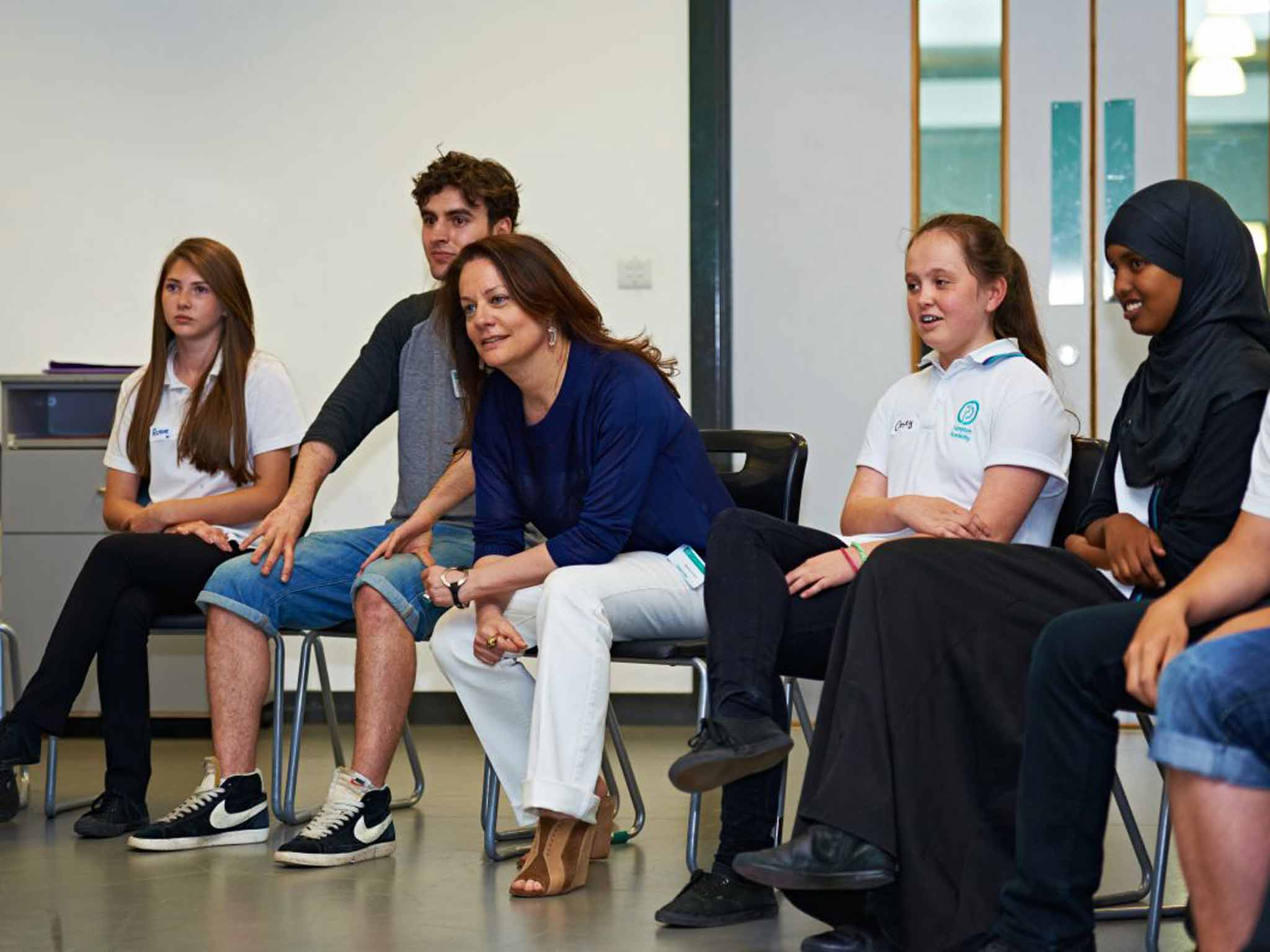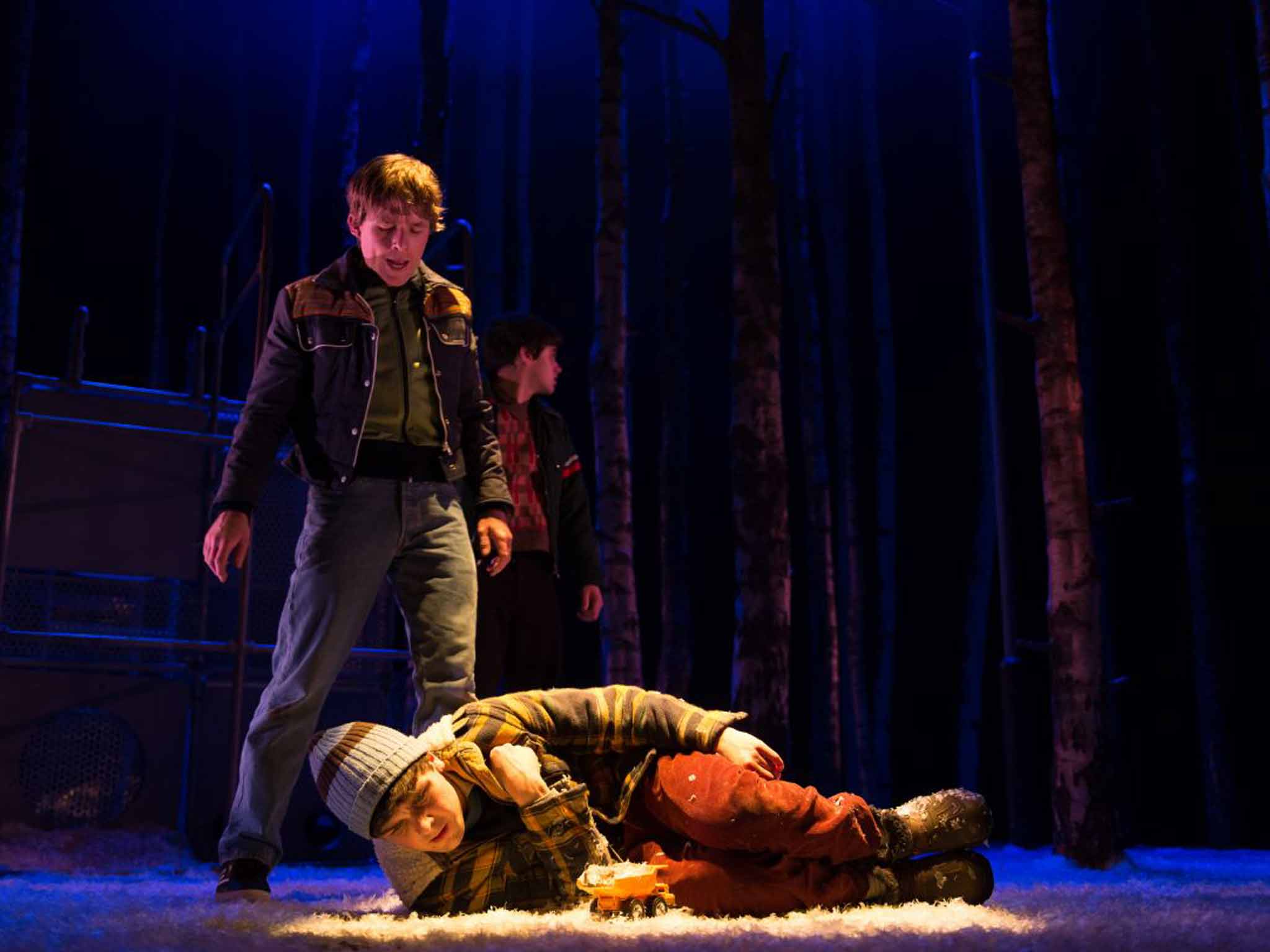Let The Right One In: Beating school bullies on stage
Theatre producer Marla Rubin never fully recovered from the torment she suffered as a child. Now, she and the cast of Let The Right One In are taking their anti-bullying message into schools.

Drugs. Isolation. Suicide. Depression. Self-harm. Confidence issues. Paranoia. A group of year 8 pupils at Hampton Academy in south-west London are discussing the consequences of bullying. They are not the normal words you hear out of the mouths of babes, but this intense conversation follows a jaunty game designed to help the children broach the issue.
Laid out is a circle of chairs – enough to seat every participant but one. The person standing introduces him or herself and says, "The sun shines on...", before adding something like: "anyone in black shoes". The children in black footwear have to run and find another seat. A fair-haired 12-year-old is left standing. "My name's Amber. The sun shines on anyone who has been bullied because of how they speak." Almost everyone rushes from their chairs.
The game continues... "The sun shines on anyone who's ever felt alone… The sun shines on anyone bullied by a friend…"
The session has been organised by BeatBullying, a charity that offers face-to-face tutorials to small groups of 11- to 17-year-olds to teach preventative strategies and create a team of student mentors able to offer advice in the playground and online. The workshops, which have been conducted since the charity's launch in 2002 and take place across the UK, are designed to empower children to feel that they are part of the solution to bullying.

A 2011 study by the University of Sussex found that across five schools that had worked with BeatBullying, there was a fall of a quarter in the number of young people being bullied. A study by the Department for Education also showed that the workshops and website were "rated by schools as an effective intervention". Zoe Brownlie, the charity's head, believes that bringing guests to these sessions helps bullied kids because they can see that adults they look up to were once in the same vulnerable position.
The five visitors today – four young actors and the West End producer behind the play Let the Right One In – might not be instantly recognisable to their audience, but bullying is at the heart of their play. To the casual theatregoer, LTROI, which has been playing to five-star reviews at London's Apollo theatre since March, might look like a stock vampire tale. Beneath the surface, though, it is a redemptive story of isolation and desperation.
In the school hall at Hampton Academy, the cast members introduce the premise of their play, discuss what bullying has meant to them – and their characters – and then answer questions. Pupils will go on to take part in "coaching sessions" in threes, with each group given a card offering a different scenario; one plays the bully, another the mentor and the third an observer. They also explore the definition of bullying, as well as the different types (verbal, social, physical, cyber) and the issues that may lead to bullying (homophobic, racial, religious, sexual) and receive training on how to use the BeatBullying website (a super-safe version of Facebook), which was rolled out in seven new languages across Europe earlier this year.
Let The Right One In is adapted from a Swedish film and has an English director and Scottish cast. But its roots (and the very personal impetus behind this workshop) lie in 1970s Canada. Producer Marla Rubin grew up in Montreal – where she was physically and psychologically targeted by a boy who came to define her childhood. "It was one bully who was at my elementary school and he had a crush on me – and I was too shy to reciprocate," she tells me in a cafe near her home in London's Earl's Court. "He was the class clown and he was really charming. And when I didn't respond to him, he started to hunt me."
The torment began when Rubin was 10, and lasted for four years. "It was shameful and it was all wrapped up in budding adolescence and your first attractions and all of that. His name was Peter. He'd talk about my body parts and embarrass me until the teacher came in. And sometimes even when the teacher was there – she or he would not stop it.
"There was an episode that was quite horrific that led to my finally telling the secret. We would take the same bus to and from school because he lived on my street. He stood in front of me and he had his friends horseshoe around him so that no one could see him. And he proceeded to unzip his pants, give himself a hand job and have an orgasm in front of me, and I just sat there. Because this was part of our thing – not expressing any emotion, because if you showed any emotion, you lost. Any vulnerability – you lost. It was excruciating. I got off the bus – the 65, I still remember – and I ran home and told my mother and brother. I finally broke that day because it was too much for me."

The victim in Let the Right One In is allowed what Rubin describes as "an extremely wondrous, albeit violent, wish-fulfilment" at the end. For Rubin, a resolution came in a less celebratory fashion – she changed schools. "Do I wish one could vanquish one's bully in a different way? Absolutely. And that's why I'm doing the workshops and trying to get the word out – that you're not impotent if you are 10."
Despite being a producer with an Olivier to her credits, telling her story still has the power to put Rubin on edge. Was she wary about connecting her present life with the vulnerability of her 10-year-old self? "Yes, but I thought it was more important to be honest than to just hide." How long did it take to come to that conclusion? "Well, you're the first person I'm really talking to in any candour about it, other than in Montreal. So I guess, quite a while!"
Rubin cites a recent Warwick University study, which has found that bullied children are nearly five times more likely to suffer a psychotic episode by the time they are 18. BeatBullying's own research has discovered that 38 per cent of young victims have considered suicide. And another study reported that victims are more likely to suffer heart problems later in life.
How does she think it has affected her? There is a sharp intake of breath. "To be honest, it's made it harder for me to trust. It's been responsible for ferocious independence. I'm a one-woman band. I do have a residual sadness that it still has an impact on my life."
But the one positive result is that it has fuelled her productions, furnishing them with "elements of deep empowerment – where the unlikely anti-hero wins, and wins according to rules that are compassionate and humane".
Rubin is convinced that these school sessions – and her shows – can do their bit to "fight for the underdog", explaining that it's one of the things that gets her out of bed in the mornings.
"I didn't have a mentor," Rubin tells the pupils, "and I wish to God that I had. Because it could have changed my life."
For more information, visit: beatbullying.org. 'Let The Right One In' runs until 30 August at the Apollo Theatre, London
Join our commenting forum
Join thought-provoking conversations, follow other Independent readers and see their replies
Comments